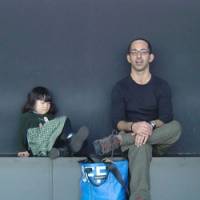"Why go to a performance instead of renting a DVD and staying at home?" ponders 44-year-old dancer, choreographer, actor and visual artist Antony Rizzi on the Boston Cyberarts Festival Web site. Rizzi feels that this is an exciting time for dance to do battle with the lethargic pull of the home entertainment system. His counterattack is to convey the awe that dance's artistic expression continues to hold for him.
Born in West Newton, Massachusetts, Rizzi first studied at the nearby Boston School of Ballet before moving to Germany in 1985 to join the Frankfurt Ballet as a principal dancer and dance teacher under U.S.-born artistic director, William Forsythe. Over the next 20 years, Rizzi danced most of the company's main roles, and also worked with Forsythe as his choreography assistant as the pair transformed the Frankfurt Ballet into one of the world's foremost contemporary dance companies before its controversial closure following subsidy disputes in 2004. Now a free agent, he mainly works with the Moving Productions dance company that he founded in Frankfurt, though he is also in demand from companies in Europe and North America as a choreographer and dance teacher.
This coming weekend, Rizzi will present a simplified staging of his autobiographical dance/drama "Every Body Tells A Story," which premiered to critical acclaim at the Boston Cyber Festival three years ago. Peppered with jokes and sarcastic grumbles, the work — which tells the story of a young dance artist's daily life — was originally performed with Rizzi and his former Frankfurt Ballet colleague Mario Zambrano alternating performances in the central role, but this time Rizzi alone is filling that berth. In addition, in a unique performance he has prepared for audiences here, Rizzi has enlisted the talents of two Japanese artists — Norito Yashima, a popular actor in NHK's English-language education program "Eigo de Shabera Naito" ("We Have to Speak in English Night") and Yoko Tani, a dancer working mainly in Europe. Together, they aim to explore the work's underlying questions of whether everybody is the same or different and how human identity may differ between East and West.
Noted for the laughs the piece's bitter jokes have drawn from Western audiences, it will be interesting to see how this version will succeed (or not) in stirring up the usually quiet Japanese audience, and it is also a good chance to see the dancer's physical movement and bodily expressions up close and personal in a small studio.
"Every Body Tells A Story" runs March 13-14 at Saitama Arts Center, an 8-minute walk from JR Yonohonmachi Station on the Saikyo Line. For more information, call the Saitama Arts Foundation at (0570) 064-939 or visit www.saf.or.jp


















With your current subscription plan you can comment on stories. However, before writing your first comment, please create a display name in the Profile section of your subscriber account page.